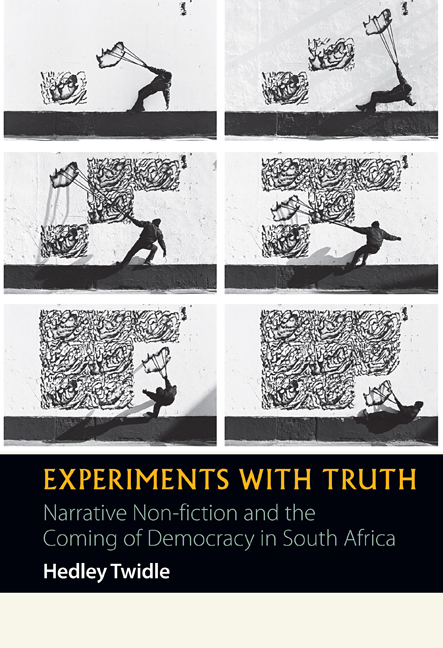Book contents
- Frontmatter
- Contents
- Preface: Encountering non-fiction
- 1 Introduction: Historical and theoretical approaches
- 2 Unusable pasts: The secret history of Demetrios Tsafendas: assassin, madman, messenger
- 3 Literatures of betrayal: Confession, collaboration and collapse in post-TRC narrative
- 4 In search of lost archives: Nostalgia, heterodoxy and the work of memory
- 5 A very strange relationship: Ambition, seduction and scandal in post-apartheid life writing
- 6 Some claim to intimacy: Political biography and the limits of the liberal imagination
- 7 In short, there are problems: Literary journalism in the postcolony
- 8 Unknowable communities: Necessary fictions and broken contracts in the heart of the country
- 9 A new more honest code: Memoirs of the ‘born frees’ and the futures of non-fiction
- 10 Afterword: The extracurriculum
- Bibliography
- Index
- Miscellaneous Endmatter
8 - Unknowable communities: Necessary fictions and broken contracts in the heart of the country
Published online by Cambridge University Press: 11 September 2020
- Frontmatter
- Contents
- Preface: Encountering non-fiction
- 1 Introduction: Historical and theoretical approaches
- 2 Unusable pasts: The secret history of Demetrios Tsafendas: assassin, madman, messenger
- 3 Literatures of betrayal: Confession, collaboration and collapse in post-TRC narrative
- 4 In search of lost archives: Nostalgia, heterodoxy and the work of memory
- 5 A very strange relationship: Ambition, seduction and scandal in post-apartheid life writing
- 6 Some claim to intimacy: Political biography and the limits of the liberal imagination
- 7 In short, there are problems: Literary journalism in the postcolony
- 8 Unknowable communities: Necessary fictions and broken contracts in the heart of the country
- 9 A new more honest code: Memoirs of the ‘born frees’ and the futures of non-fiction
- 10 Afterword: The extracurriculum
- Bibliography
- Index
- Miscellaneous Endmatter
Summary
The Mitchell property lies on the slopes of one of the most beautiful valleys I have ever seen. It is in the heart of the southern midlands of KwaZulu-Natal, Alan Paton country, and it is true that ‘… from here, if there is no mist, you look down on one of the fairest scenes of Africa’. Later I will tell you more about that landscape, and how it changed during the course of my investigation; a spectacular backdrop of giant shapes and colours when I first saw it, a myriad dramas of human anger and violence when I left. (3)
So reads the opening of chapter one in Jonny Steinberg's Midlands, a book that will chart the author's immersion in a southern KwaZulu-Natal farming community as he tries to understand the circumstances that led to the murder of a 28-year-old man, Peter Mitchell. It begins with the grieving but resolute father, Arthur Mitchell, proprietor of the farm Normandale, a man determined to stay on the land even while convinced that his labour tenants are harbouring the perpetrator. In one sense this establishing shot announces the beginning of the book's primary journalistic narrative, its ‘story’: ‘I arrived at the Mitchells’ front gate at mid-morning on an unforgivingly hot day in the summer of 2000’ (3). But as this temporally split and self-consciously literary opening suggests, Midlands is a work haunted by all manner of other, possibly unknowable or untellable stories, stories that precede, interrupt, divert and perhaps even fatally undermine what seems at first to be a work of investigative journalism or true crime.
The book achieved immediate visibility in South Africa for addressing what have come to be called ‘farm murders’: a contested and controversial term, since (amid very high rates of largely black homicide victims in rural areas), it principally connotes the killings of white farmers. A new phenomenon within the post-apartheid dispensation, such murders have come to occupy ‘a strange and ambiguous space’ in the national imaginary, writes Steinberg, in that ‘they tamper with the boundary between acquisitive crime and racial hatred’ (Midlands vii). Peter Mitchell, we read early on, ‘was killed, not just figuratively, but quite literally, on the southern midlands’ racial frontier, the dust road on which he died a boundary between the white-owned commercial farmlands to the west and the derelict common land of a dying black peasantry to the east’ (viii–ix).
- Type
- Chapter
- Information
- Experiments with TruthNarrative Non-fiction and the Coming of Democracy in South Africa, pp. 159 - 184Publisher: Boydell & BrewerPrint publication year: 2019

